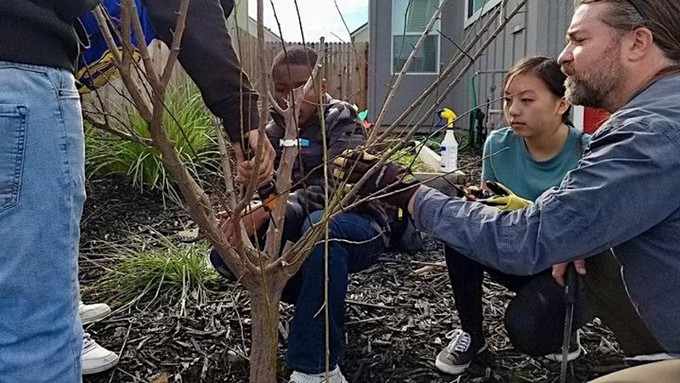
Alchemist CDC offers two free workshops in Sacramento

The skills and tools of fruit tree pruning are just part of two workshops offered this month by Alchemist Community Development Corporation. Photo courtesy Alchemist CDC
Learn a gardening skill – pruning fruit trees – while helping your community.
The Alchemist CDC is offering two free workshops, focusing on winter care for deciduous fruit trees. Participation is free for these hands-on events, but advance registration is necessary.
On Feb. 12, the workshop will be held at Oak Park Art Garden, 3834 Martin Luther King Jr. Blvd., Sacramento. (Register here: https://bit.ly/3K6WKjU.) On Feb. 19, the pruners in training will tackle Mirasol Village Community Garden, 701 Pipevine St., Sacramento (just south of Richards Boulevard). (Sign up here: https://bit.ly/3YYYwIr.)
Both pruning workshops will be held from 9 a.m. to 1 p.m. More details are available (search for "fruit tree pruning") via eventbrite.com.
“Learn the essential skills of winter fruit tree pruning at one of Sacramento’s community orchards,” say the organizers. “We’ll explore the craft of pruning, the tools that make it possible, and demonstrate the practice on fruit trees in the community orchard. We’ll also explore how urban agroforestry can play a significant role in enhancing the resilience of our urban ecosystems and communities to a changing climate.”
What is urban agroforestry? Growing (and managing) fruit trees in the city for residents to enjoy.
Dominic Allamano, an urban agroforester and experiential educator, will be the instructor for both workshops. According to his website bio, Allamano is working “at the intersection of urban food system repair, climate change adaptation and the long term re-connection of communities and the land they inhabit together.”
He worked for five years as the Edible City Coordinator at Soil Born Farms, developing an urban food forestry initiative that included the regional Harvest Sacramento fruit gleaning program, as well as garden building and fruit tree planting programs serving residents of South Sacramento, says his bio.
Focusing on food and nature, Alchemist Community Development Corporation is a fast-rising force for good in Sacramento-area neighborhoods – “connecting communities with land, food and opportunity.”
"Alchemist CDC is a mission-driven organization that connects Sacramento area communities to land, food, and opportunity toward a vision in which all neighborhoods are vibrant, equitable, healthy, and diverse,” according to the organization. “We are best known for enhancing the quality of life in under-resourced communities by improving access to nutritious foods, implementing community-supported public green spaces, and fostering economic self-sufficiency through business entrepreneurship.”
Details: https://alchemistcdc.org/.
Comments
0 comments have been posted.Sacramento Digs Gardening to your inbox.
Food in My Back Yard Series
April 29: What's (already) wrong with my tomato plants?
April 22: Should you stock up on fertilizer? (Yes!)
April 15: Grow culinary herbs in containers
April 8: When to plant summer vegetables
April 1: Don't be fooled by these garden myths
March 25: Fertilizer tips: How to 'feed' your vegetables for healthy growth
March 18: Time to give vegetable seedlings some more space
March 11: Ways to win the fight against weeds
March 4: Potatoes from the garden
Feb. 25: Plant a fruit tree now -- for later
Feb. 18: How to squeeze more food into less space
Feb. 11: When to plant? Consider staggering your transplants
Feb. 4: Starting in seed starting
Sites We Like
Garden Checklist for week of May 4
Enjoy this spring weather – and get gardening!
* Plant, plant, plant! It’s prime planting season in the Sacramento area. Time to set out those tomato transplants along with peppers and eggplants. Pinch off any flowers on new transplants to make them concentrate on establishing roots instead of setting premature fruit.
* Direct-seed melons, cucumbers, summer squash, corn, radishes, pumpkins and annual herbs such as basil.
* Harvest cabbage, lettuce, peas and green onions.
* In the flower garden, direct-seed sunflowers, cosmos, salvia, zinnias, marigolds, celosia and asters. (You also can transplant seedlings for many of the same flowers.)
* Plant dahlia tubers. Other perennials to set out include verbena, coreopsis, coneflower and astilbe.
* Transplant petunias, marigolds and perennial flowers such as astilbe, columbine, coneflowers, coreopsis, dahlias, rudbeckia and verbena.
* Keep an eye out for slugs, snails, earwigs and aphids that want to dine on tender new growth.
* Feed summer bloomers with a balanced fertilizer.
* For continued bloom, cut off spent flowers on roses as well as other flowering plants.
* Add mulch to the garden to maintain moisture. Mulch also cuts down on weeds. But don’t let it mound around the stems or trunks of trees or shrubs. Leave about a 6-inch to 1-foot circle to avoid crown rot or other problems.